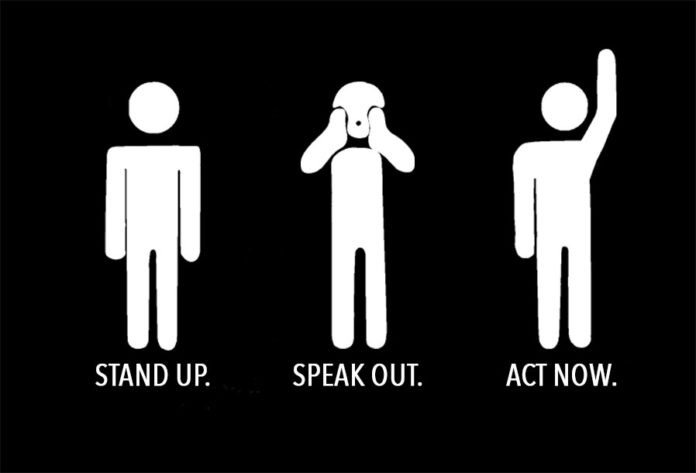The following editorial addresses gendered violence, interpersonal violence, sexual assault and rape.
When we come to campus as first-year students, we learn about bystander intervention as it pertains to sexual assault and interpersonal violence. We learn what to do as witnesses of nonconsensual interaction. We learn that no means no. We learn that any kind of absence of consent is assault– without exception. Why do we need to be told this? If we lived in a world that did not create institutions and structures that dehumanize survivors of sexual assault and protect rapists and their sympathizers, we wouldn’t need this education. The need for these programs, from ‘Step UP!’ to the Women’s Center’s ‘Consent 101’ lecture, is proof enough that we live in a rape culture; the fact that some dispute its existence despite systemic re-victimization of survivors appalls us as a staff.
One of the results of rape culture is that standing up to those who commit, condone or OK interpersonal and gendered violence has the potential to result in social isolation or judgment. We get it. We’ve been in that spot. It’s awkward and uncomfortable, and sometimes it feels as though you’re standing up to the massive institution that is rape culture, including the normalization of interpersonal violence, wouldn’t result in a measure of success that would constitute its social repercussions.
While we empathize with the awkwardness of interrupting a conversation because of oppressive language, or really any language that promotes or subtly condones gendered violence, let us be clear: if you are in a public, safe space, any social discomfort you feel as a result of standing up for the 1 in 3 women and 1 in 16 men who are sexually assaulted is infinitesimally unimportant when you consider the current status quo: survivors living in a world in which we throw around jokes like “that test raped me” without a second thought. The social repercussions of you doing the right thing are nothing compared to the people for whom interpersonal violence is a part of daily life.
It becomes a lot less difficult to speak up when you consider that you walking by, you being quiet, you not speaking up, you are complicit in rape culture—in a type of violence that disproportionately affects women, people of color, and LGBT+ people.
Knowing that rape is wrong is not enough. Knowing that nonconsensual intimacy is wrong is not enough. Knowing is not enough. You can recite the ‘Step UP!’ or ‘Consent 101’ lectures verbatim, but if you do not apply that knowledge, if you refuse to be a barrier in the way of rape culture, then you are letting it continue. On your campus, around your neighborhood, in your home.
We aren’t writing this to make you feel guilty for the moments you could have spoken up. We are writing this to assure you that we have been there too, but, in the same breath, that there is no excuse for not standing up in a situation where you are physically safe. Whether that is on Twitter, at Rocky’s or in your closest group of friends. We can’t will sexual assault, violence against women and LGBT+ people and institutionalized oppression away, but we can refuse to take part in their progression. No, you saying that your friend’s (or a stranger’s) rape joke or victim-blaming is unacceptable won’t lessen the U.S. assault rates, but it will leave that seed of doubt in your friends’ mind. It will make the oppressive language harder to listen to in the future. It will be a beginning. It will start the cracking of the structure that makes these kinds of jokes okay, that makes us question a survivor’s clothing choice before the attacker’s motives.
Rape culture won’t crumble tonight, or tomorrow, this year or even in the next ten. But with fewer and fewer people being passive about the language and rhetoric of rape culture, we can start collecting the tools to start.






